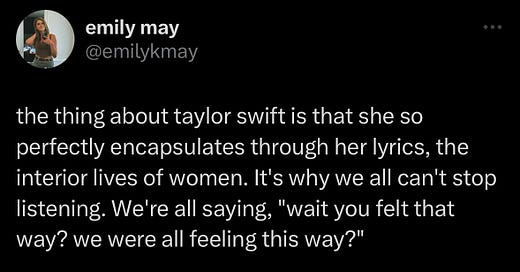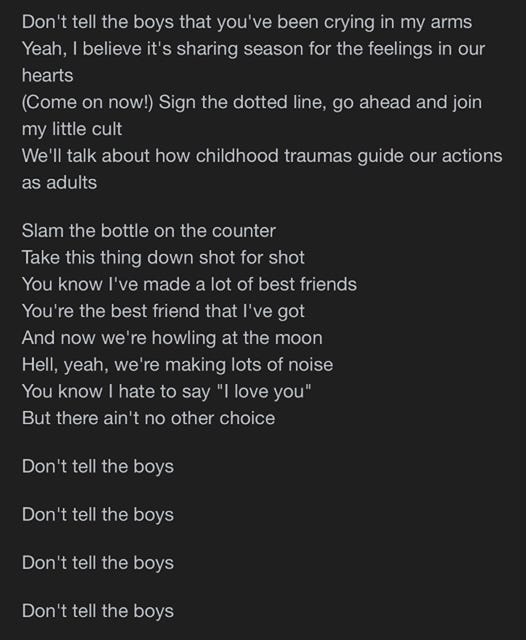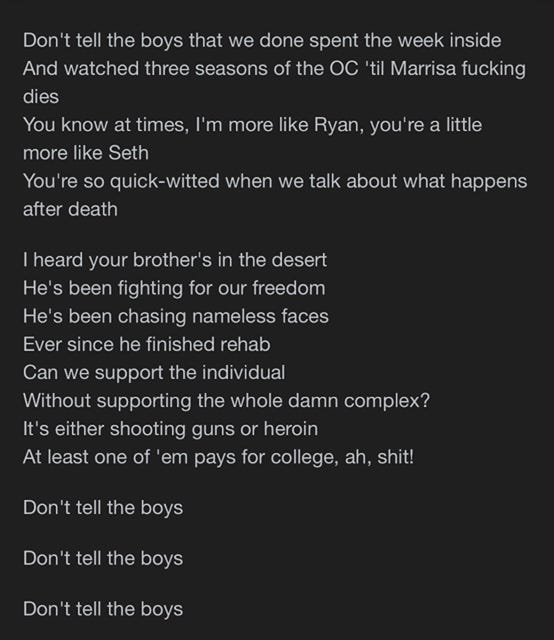I was drinking coffee in a SoHo bookstore sitting at a tiny cafe table with a friend from the internet as snow swirled outside. I was in town for a wedding and we decided to meet up last minute, as I am prone to do with folks from Twitter. I always have a twinge of nerves right before I meet an online friend for the first time, but we effortlessly transition from Twitter friends to real-life friends who already know so many of each other’s mundane musings. I am forever surprised that it feels nearly seamless to hang out with people who have been reading my most unfiltered and not-yet-fully-formed thoughts.
Our conversation gravitated towards Taylor Swift, a recurring topic for me. I launched into an impassioned discourse about how she has tapped into something in a huge swath of women. There is a significant cohort of us who feel like she is putting words to our interior experience, giving us language for feelings that we know exist but can’t quite articulate. We then moved to the topic of masculinity, another favorite discussion, and how men in our culture often miss out on the connectedness that comes far more easily in female friendships. In between oat milk latte sips, I asked him, “Do men have an equivalent to Taylor Swift?"
He paused thoughtfully. He is a new Swiftie. A musician and songwriter by trade, but a generation ahead, and was certainly not "feeling 22" in 2012 like the millennials who felt like she was writing the soundtrack to our adolescent lives. But, like so many, he got swept up in the Swiftdom in the last few years and heard "All too Well" and said it was "pure poetry." Despite my decade-long fandom, I still get some kind of validation when folks who aren't millennial white women confirm she's talented (but that's a topic for a different essay).
"I don't think we do. Not in the way you're talking about. You should tweet that, it's an insightful question."
Famous last words.
Late that night in my hotel room, I fired it off, thinking that maybe a few hundred people who regularly interact with what I write would see it and comment. I was perhaps overconfident that I would be understood. Instead, I became a new meme.
If I had thought it would have this level of reach, I certainly would have written it with less…absolute language, but alas. The question I was really asking was: Who is a male music artist who has a similar reach and impact as Taylor, who has a majority male fan base, and who cultivates connection between men? Which current artist could fill a stadium with mostly men and chart on the top 10? Where do men gather and talk or sing about the unique pain that comes from being raised male in a patriarchal society? How the privilege most certainly exists, but it comes at a cost? The things they feel that are deemed too shameful to say out loud? If male pop artists sing primarily about their inner lives and love and loss, they often still have a majority female fan base (think Ed Sheeran).
Some people did attempt to answer the question and a lot of folks said Dylan, Springsteen, and Johnny Cash. Which are all good answers in terms of stardom, impact, and drawing lots of male listeners. But with Johnny Cash dead and Dylan and Springsteen in their final chapters, who is the millennial or Gen Z Springsteen?
Twitter did what it does best: misunderstand people. But something I noticed was how embarrassed I felt for saying I loved Taylor. It was embarrassing to say that she was giving me language to process emotions that made me feel "crazy" and had only ever been expressed in my journals. Even though "22" is a fun bop, I was indeed feeling "happy, free, confused, and lonely at the same time" at age 22…and it was both miserable and magical! And it was because Taylor was never afraid to embrace "cringe," but her words were so earnest.
When Taylor sings, "I hosted parties and starved my body like I'd be saved by a perfect kiss" - she is tapping into a collective consciousness of the women raised to be terrified of weighing more than 100 lbs on our wedding day, who felt the heaviness of the status symbol of being able to fit into 00 low rise jeans, and who had been conditioned to believe (and for some of us, hope) that male validation would ultimately rescue us. It was rare, we were there.
When Taylor pleads, "give me back my girlhood, it was mine first" too many of us remember when someone who was a "promising grown man" stripped us of our innocence. We were children when we were catcalled or had our bras snapped and were told that "boys will be boys," or told that we bore responsibility for the behavior of men who might view our exposed adolescent shoulders in spaghetti straps. We were children when we first felt the weight of the responsibility of existing in the female body. The wound won’t close. It was not rare, we were there.
When Taylor admits to the humiliating things that so many of us have done or thought. Canceling plans just in case he’d call. Thinking about jumping off of very tall somethings, just to see if he’d come running. Eyeing their location that they forgot to turn off. Crying at the gym about someone who avoids you like the plague. Keeping someone like an oath who kept you like a secret. When you would have died for the sins of someone who your friends always hated and who wouldn’t return your texts. Making someone your “temple, mural, and sky” who will barely let you be a footnote in their life story. When you just don’t understand how someone doesn't miss you when that song by The Starting Line comes on.
Taylor makes me love being a woman in a culture that routinely deems feminine things as unserious, shallow, and mock-worthy. She also poignantly describes the shame and confusion and self-betrayal that many of us have uniquely experienced because of our womanhood. She gives voice to the insecurities and fears we often bury, but when she says them, we realize how many of us were feeling them. We were never alone.
She has an unreleased and unrecorded song called "your anything" that somehow made it onto my ipod in 2005 and even though I could barely hear the crappy audio from the live acoustic performance, i still remember the chorus she wrote in probably ninth grade:
I could be your favorite blue jeans
with the holes in the knees
in the bottom of the top drawer
I could be your little beauty queen
just a little outta reach
or the girl living next door
I’ll be your angel giving up her wings
if that’s what you need
I’d give everything to be your anything
That song in my opinion is what came before “mirrorball,’ which she wrote almost 20 years later:
I want you to know
I'm a mirrorball
I can change everything about me to fit in
You are not like the regulars
The masquerade revelers
Drunk as they watch my shattered edges glisten
"I became the person everyone wanted me to be" - she shares about the endless self-curation to make herself palatable, how she would abandon herself and reinvent herself into the version of her that someone else wanted. A “pathological people pleaser.” We remember the obvious, cringey ways that we did it as a fourteen year old, but for me personally it's a lifelong struggle to have a strong sense of self that I refuse to give up in order to get other people to like me.
The thing about Taylor is that she doesn't just write about her inner life, she evokes something in us that makes us want to talk about it. She is connecting us to each other, helping us look inward and undo all of the shitty things we have been taught to believe about ourselves. For me, when I listen to her, I am processing and undoing my deep need for approval, my tendency to find my identity solely in what I can do for others, and of course, the constant anxiety of wondering if I am too much.
Taylor isn’t universal. There are plenty of women who don’t resonate with her songs (this was made abundantly clear in my thousands of QTs!) but when I hear words like “basic, vapid, shallow, narcissistic, juvenile, generic, mediocre” I just wonder if people legitimately think that describes the hundreds of millions of women globally for whom her music resonates?
If a Taylor Swift concert is a form of catharsis for so many women, where do men go to process emotions communally? Many men are disconnected from each other and disconnected from themselves. I have had men say to me that they feel as though their inner lives must be guarded, that the inherent trust that lots of women have between each other doesn’t come quite as easily. Anger is an appropriate emotion, crushing fear about your inadequacy is not.
Lots of folks mentioned alternative music or the entire emo genre, but the thing is…it was alternative. Boys who liked emo music were mocked by the “mainstream.” They were the ones wearing skinny jeans and eyeliner, and the fan base was still at least half women (myself included, as a Chris Carrabba and Andrew McMahon lover). Drake and Eminem were the two answers that I think came the closest, but the best answer according to the limited sample of men I asked was….sports. Sports is the place where they said they are able to exhibit a full range of emotions. The overwhelming joy of victory, the agony of defeat. There is community and camaraderie. Tears and grief are understood and completely appropriate. It may not be screaming the bridge from “illicit affairs,” but it is providing an outlet that is otherwise rarely accessed.
Amongst the thousands of quote tweets and replies calling me the dumbest bitch alive were a couple of other overwhelming themes. Namely, “men don’t need music to validate their emotions because we are men.” “Men don’t wallow in their feelings.” “Men don’t look to others to find their purpose, we act on logic and independently of how others feel” but with male suicide rates outpacing women by miles and when the majority of physical violence is committed by men, I’m not convinced the men are all right.
When I have asked men this question at cafe tables or dive bars, they have all had the same reaction. “That’s a good question. I can’t think of a comparable artist. I don’t know why.” I asked one friend if he had a song that made him have a visceral reaction specifically from a male perspective, the equivalent to when I heard “I hosted parties and starved my body.” He sent me this song called, “Don’t tell the boys.”
I’m trying to picture a stadium filled with 75,000+ people who are mostly men, night after night, scream-singing a song like this. And I can’t. And maybe lots of men feel fine with that. All I know is screaming: “and there we are again when nobody had to know, you kept me like a secret, but I kept you like an oath” with a chorus of thousands of women healed something in me. Something about letting out those mortifying words and hearing them echoed around you. We are cringe, but we are free.







My personal (gay 26M) Taylor is Twenty One Pilots, and also K.Flay (who is a woman) ❤️🧡💛🤍🖤💜
U2 all my life
The band called "Typhoon"
Early Dave Matthews
Glenn Hansard
Music and books are key tools for me to processs my emotions
My wife and daughters get so much joy from Taylor's music. I'm grateful for her work and the joy it brings them. I'm not a Swiftie but I'm Swiftie adjacent 😎